Photos: Halloween in Batavia, 2014
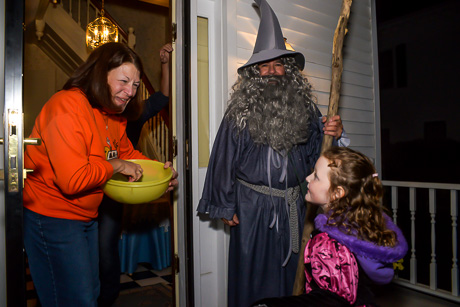
There were trick or treaters out all over the City of Batavia last night.
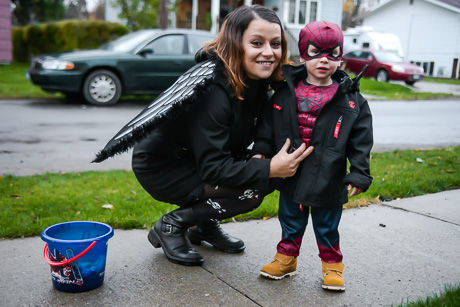
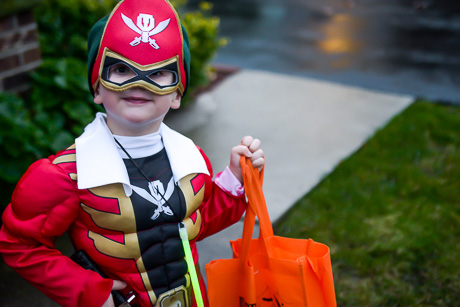
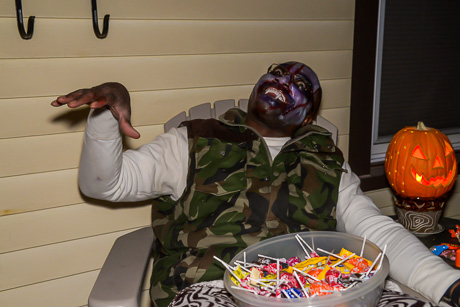
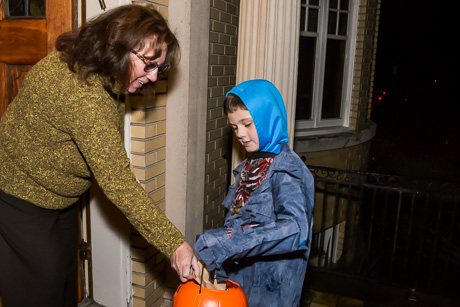
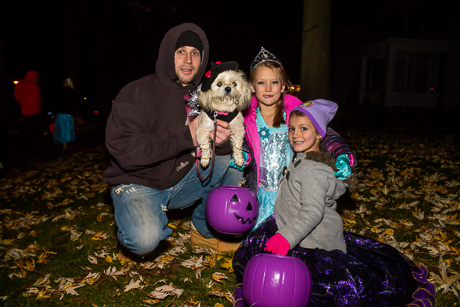
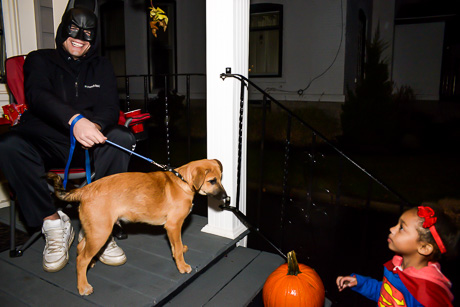
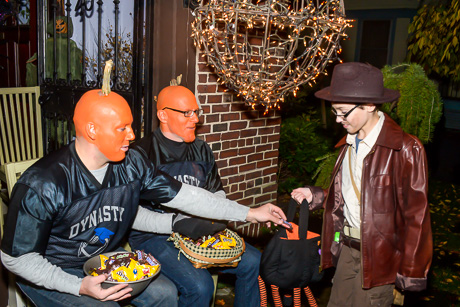
To purchase prints, click here.

There were trick or treaters out all over the City of Batavia last night.







To purchase prints, click here.
A car and semi-truck have collided on the Thruway in the westbound lane near mile marker 386.6
That's about two-tenths of a mile east of the Bank Street Road overpass.
There are only minor injuries.
Town of Batavia fire is responding along with Mercy EMS.
A chief on scene reports, "we've got one against the inside guard rail and one against the outside guard rail."
The left lane is blocked.
UPDATE 8:33 a.m.: A chief reports a correction on vehicles. One passenger vehicle and one flatbed truck, unloaded.
State funds for a system of bicycle trails around the city of Batavia, which the governor's office announced Monday, are actually eamarked for sidewalk replacements and repairs, not biking trails, according to City Manager Jason Molino.
The Healthy Schools Corridor project is slated to get $720,657 for sidewalk improvements on Summit Street, Liberty Street, South Liberty Street and Washington Avenue.
Today's press release:
With a $720,657 grant from the Transportation Alternatives Program (TAP) funded by the Federal Highway Administration and administered by NYS Dept. of Transportation, the City of Batavia Public Works Department will be able to expand sidewalk replacements along Summit and Liberty streets and Washington Avenue.
The project will include the removal of old sidewalks, installation of new sidewalks, handicap access ramps, high visibility crosswalks and selective tree removal and will be matched with $240,219 of City funds. In total the $960,000 project will include over 12,300 linear feet of improved sidewalks providing safer routes for pedestrians and bicyclists connecting United Memorial Medical Center, Batavia Middle School, St. Joe’s School, the Downtown Corridor and Jackson Elementary School.
“Improving sidewalks has been a priority for City Council and this grant will allow us to do even more over the next few years” said City Council President Brooks Hawley. “With this grant we will be able to make our sidewalks safe for our residents and children.”
The City has approximately 73 miles of sidewalk, and in 2011 it was estimated that more than 20 percent of the sidewalk system needed repair. The City has made a concerted effort since to 2011 and has replaced over 26,500 linear feet, or almost 7 percent of the sidewalk system. This includes more than 130 curb ramps.
“This grant will allow the City to more than quadruple our annual effort,” said Sally Kuzon, director of Public Works.
Sixth Ward Councilwoman Rosemary Christian and longtime advocate for sidewalk improvements added, “I’m ecstatic about getting this grant. Every year I ask for more and more sidewalk improvements and now we are going to do almost $1 million in one year. Our residents deserve it.”
TAP provides funding for non‐motorized transportation alternatives such as bicycle and pedestrian facilities, safe routes to schools projects, trails, and other infrastructure improvements to the transportation system. The City applied for the grant in June 2014 and was one of seven communities in the nine-county Finger Lakes Region to receive an award.
Press release:
The City of Batavia Fire Department along with the City of Batavia Fire Fighters Union – IAFF Local 896 is proud to announce the winners of our Second Annual Fire Prevention Poster Contest. We would like to thank all of the students who participated in this year’s Fire Prevention Week poster contest.
Group 1:
First Place - Kaitlyn Bartz “Working Smoke Alarms Save Lives”
Jackson Primary School
1st Grade
Second Place - Anthony Kopper “Working Smoke Alarms save Lives”
John Kennedy School
2nd Grade
Third Place - Emmeline Bateman “Go to Your Outside Meeting Place”
Jackson Primary School
1st Grade
Group 2:
First Place - Violet March “Working Smoke Alarms Save Lives”
St. Joseph's School
3rd Grade
Second Place - Katelyn Kowalski “Working Smoke Alarms Save Lives”
St. Joseph's School
3rd Grade
Third Place - Kaitlyn Landers “Working Smoke Alarms Save Lives”
St. Joseph's School
3rd Grade
Group 3:
First Place - Sophie Fulton “Smoke Alarms Matter”
Batavia Middle School
5th Grade
Second Place - Alyssa Koladzinski “Check Your Smoke Alarm Every Month”
Batavia Middle School
5th Grade
Third Place - Amber Fitzsimmons “Fire Alarms Save Lives”
Batavia Middle School
5th Grade
The 1st Place winner of each group will receive a ride to school on a City Fire Engine. A luncheon will be on held Saturday, Nov. 1st from 11 a.m. – 12:30 p.m. at the Fire Station on Evans Street for all 1st, 2nd and 3rd place winners. Congratulations to all of the student winners!
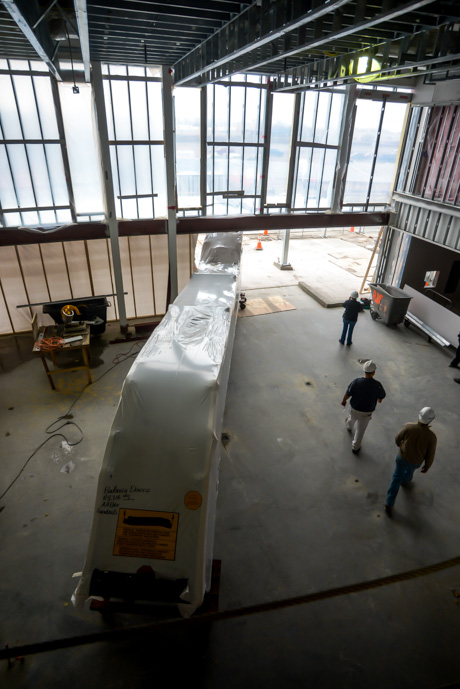
Batavia Downs is in the home stretch of a $20 million expansion that includes a new gaming floor, a new sign, new offices, and in the final phase, a new facade and entry on Park Road.
Today, a pair of 7,500-pound escalators are being installed and soon a statue of Fortuna, the goddess of good luck, will arrive from Wisconsin.
With the last major pieces in place, it's just a matter of putting on the finishing touches.
The new gaming floor, now on the first floor, opened last October. The old gaming floor on the second level is now offices for Batavia Downs and Western OTB staff.
The escalator to the second floor will provide access to the clubhouse and grandstands as well as a new OTB inter-track wagering facility, which will move from its current location across the street on Park Road.
The entry way will feature lighted neon and Fortuna will stand through a hole in the ceiling so she can be viewed from ground level or from up above.
"It's just going to look incredible," said Ryan Hasenauer, marketing director for Batavia Downs.
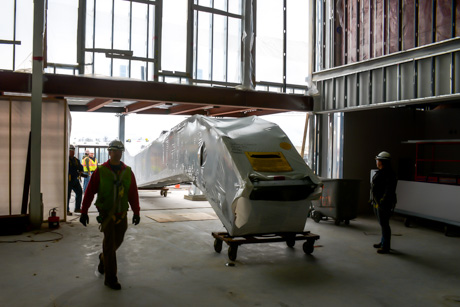
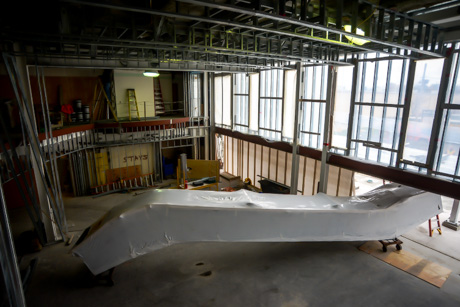
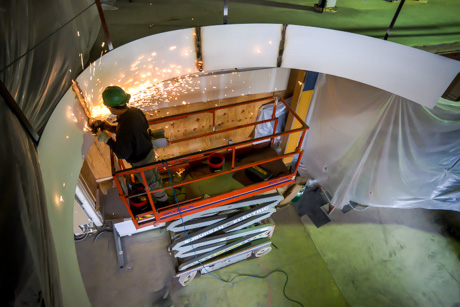
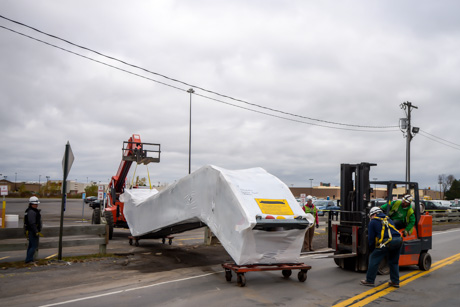
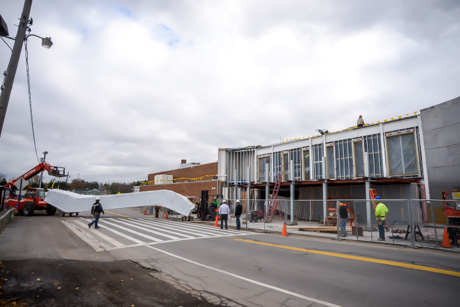
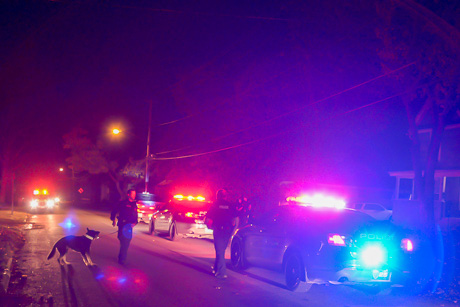
A caller reported seeing youths trying to break into cars on Kibbe Avenue, and seconds later said they were leaving the area at a high rate of speed, heading southeast on South Jackson Street.
Within a minute, a patrol stopped a vehicle with two or three occupants.
The officers were attempting to question them.
On a car-to-car transmission, one officer drolly tells another, "they have no idea who they are."
The individuals are being separated for further interviews.
At the same time, officers are tracking individuals who are going through one of the cemeteries on Harvester Avenue. A K-9 is on scene.
UPDATE 10:45 p.m.: Both incidents are related. A total of six people are involved. When Batavia police officers pulled over a pickup truck to question the driver about the Kibbe complaint, two passengers fled the vehicle on foot and were seen going into the cemetery. The cemetery area is cordoned off; the K-9 was taken off leash to hunt for the two suspects. One has been apprehended; the other remains at large. Three additional passengers remained inside the truck; one is a female who appears to be in her teens. One of the males at large is described as white, about 15 years old, with a thin build.
UPDATE 11:23 p.m.: Batavia PD is still on scene questioning two individuals. One individual remains at large. Police located a GPS unit in the vehicle and are trying to determine if it's stolen. We don't anticipate any further updates tonight unless there's a significant development.
UPDATE noon, Thursday: No arrests were made. The investigation is continuing, according to Assistant Chief Rob Yaeger.
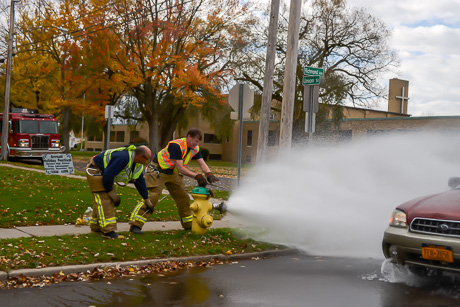
Heading toward the incident on Lewiston Road this morning, while heading down Richmond, when I got to Union Avenue, I came upon City firefighters in the midst of hydrant flushing.
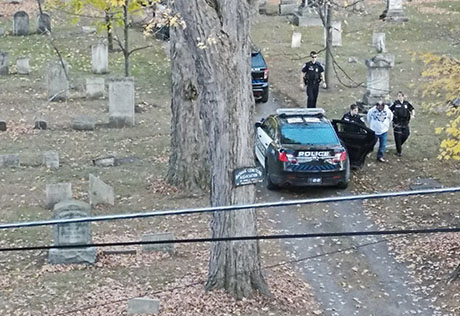
Ted E. Kingsley, 42, of Prune Street, Batavia, was arrested on a bench warrant. Police responded to a tip that Ted Kingsley, wanted on a City Court warrant, was residing at 11 Prune St., Batavia. Patrols went to the residence but were unsuccessful in locating Kingsley. Patrols checked the surrounding area, including the cemeteries on Harvester Avenue. During the check, a subject identified as Kingsley was seen running through Batavia Cemetery. Officers gave chase and Kingsley eventually stopped at the request of a police officer and he was taken into custody without incident. Kingsley was jailed on $100,000 cash bail. (Photo: Monday's arrest in the Batavia Cemetery submitted by Jim Woodhams III.)
Maleak H. Green, 21, of South Main Street, Batavia, is charged with criminal contempt, 1st, harassment, 2nd, criminal obstruction of breathing and unlawful imprisonment. No details released on the alleged incident reported at 1:20 a.m. Green was jailed on $10,000 bail.
Christina L. Fox, 26, of Bank Street, Batavia, is charged with petit larceny. Fox is accused of stealing the property of somebody she knows.
Samantha L. Hicks-O'Connell, 27, of Ellsworth Avenue, Batavia, is charged with endangering the welfare of a child, aggravated unlicensed operation, 2nd, unlicensed operation and back seat passenger under age 16 without a safety belt. Hicks-O'Connell was stopped at 5:34 p.m Oct. 8 on Liberty Street, by Officer Jason Ivison after a complaint was received of a female driving a pickup truck with a 10-year-old child riding in the back. NOTE: After reviewing the press release following a complaint by Hicks-O'Connell (see comments), we should note the release does not specifically state a traffic stop was involved in the chargers.
(name redacted upon request), 25, of Harlem Road, Amherst, is charged with possession of a hypodermic instrument, operation of an unregistered motor vehicle and no seat belt. xxxx was stopped at 3:50 p.m. Tuesday on Lewiston Road, Batavia, by Deputy Joseph Corona for alleged traffic violations.
Curtis Lamont Williams, 34, of Ellicott Street, Batavia, was arrested for an alleged Family Court Act violation -- failure to pay child support. Williams was arraigned in Family Court and released because his child support is almost up to date. He was ordered to return to court Nov. 10.
Ronald Warran Sloat, 73, of Godfreys Pond Road, Bergen, is charged with trespass. Sloat is accused of failure to leave another person's property after being told several times to leave.
Bruce Devan Reid, 52, of Saint Paul Street, Rochester, is charged with possession of burglary tools and attempted petit larceny. Reid is accused of possession of tools that would have helped him steal items from parked cars. He was jailed on $4,000 bail.
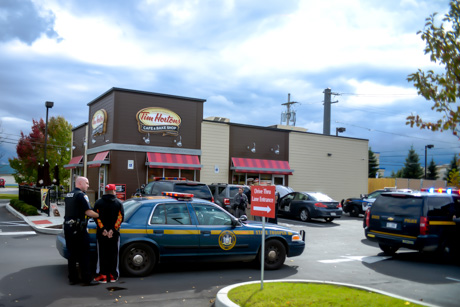
Two individuals are in custody because they have warrants out on them and two others were released following an incident that occurred late this morning at Tim Horton's on Lewiston Road.
Law enforcement initially responded to a report of four people loading a gun in the parking lot of the Tops Market plaza. After a search of the area, including a foot patrol, nothing was found. Soon thereafter, the suspect vehicle was spotted by an officer as it pulled into the parking lot of the new Tim Horton's.
Sheriff's deputies, City PD and State Troopers responded and with guns drawn apprehended the four suspects. A search turned up nothing except a small amount of marijuana inside their vehicle. The two people with active warrants were kept in custody and two others were released.
UPDATE 3:50 p.m. (by Howard): Initial information above based on what we were first told at the scene. Only one person was released without charges. The driver was arrested and charged with unlicensed operation and unlawful possession of marijauna. Investigators spent a good deal of time interviewing the four individuals. Det. Thad Mart, Batavia PD, said the investigation is ongoing, but declined to discuss what investigators are still looking at in the case. The vehicle was initially reported near the Verizon store. Mart said based on the report originally called in, it was something to take seriously. "Obviously, in this day and age, somebody loading ammunition into a firearm in a public parking lot, it raises some eyebrows and some cause for concern. We have to be concerned about the public and be concerned about officers investigating."
UPDATE: We should have included that the vehicle was a rental. Two of the subjects were from Orleans County and two from Monroe County. The vehicle was impounded.
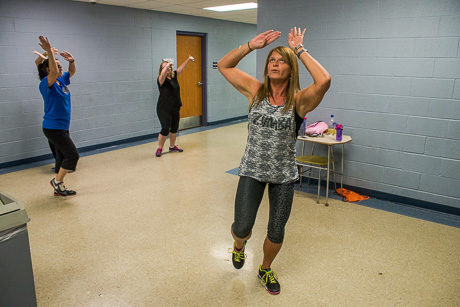
A couple dozen vendors participated today in a community health fair at the Batavia Middle School sponsored by Batavia Teachers' Association.
Above, Jen Housknecht gives a zumba demonstration class. Below, a visit with the booth for Genesee Dental.
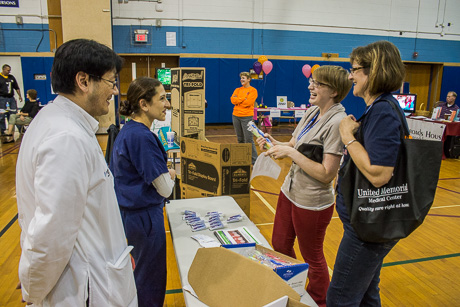
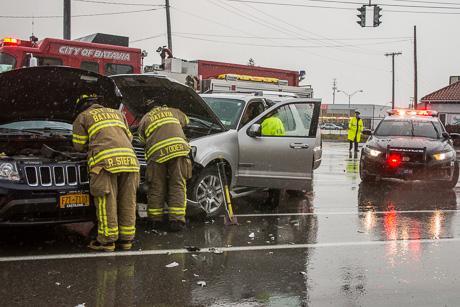
A two-car accident is blocking westbound traffic on Ellicott Street at Jackson. Injuries are believed to be minor. There is one person possibly entrapped. City fire and Mercy medics are scene.
UPDATE 5:04 p.m.: City Fire back in service.
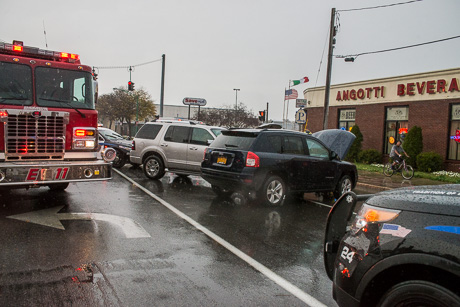
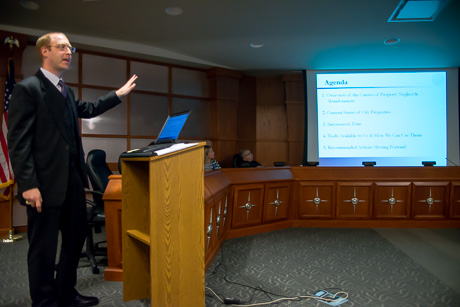
There are an estimated 53 vacant and abandoned homes in the City of Batavia, which creates a drain on city resources, brings down property values for neighbors and are black holes in local economic growth.
It's a problem.
How we go about solving that problem was the subject of a 45-minute talk Monday evening by City Manager Jason Molino.
Forty-five minutes. It's that complicated of a problem.
The city can't legally seize the properties, except for the nine or so that are falling behind in property taxes, and with banks that hold mortgages leaving the properties in legal limbo, there's no way for the city to enforce code violations.
Fixing the problem will take a mixture of tactics: research to locate responsible title holders; trying to locate mortgage holders and convince them to move the title one way or another; convincing Albany legislators to change state law regarding abandoned properties; and creating programs locally to make upgrading abandoned homes more economically feasible.
It's relatively easy to identify which homes in the city have been abandoned. They've stopped using city water.
The 53 homes believed to be abandoned have been vacant an average of three and a half years.
On average, they've generated five visits each year while vacant from code enforcement officers, and one police patrol response per year.
The code enforcement efforts cost taxpayers about $8,000 per year.
Often, the code enforcement citations result in no action because the previous owner who occupied the property can't be located. And though a bank or mortgage holder is continuing to pay taxes on the property, the bank hasn't taken title so it can't be held legally accountable for code violations.
Molino said there's no one answer, and no firm reason is really known, as to why banks don't take title on abandoned properties.
It could be that a large institution is dealing with so many mortgages, nobody is even aware a particular property is on its loan rolls or is abandoned. It could be the company is dealing with so many abandoned properties, some fall through the cracks. It could be that a bank is so bogged down by bureaucracy that it takes years to deal with the paperwork of an abandoned property. It could be the bank has no financial incentive, and some disincentives, to deal with the property.
"We really have to dig into that issue," Molino said. "That's one of the things we really need to look into in the coming months to really understand who are all the lending institutions and why are they not moving on title. ... We really need to get a good understanding of that, because everything hinges on moving title for these properties."
Once a property is back on the market -- either the bank puts it up for sale or auction or the city somehow obtains title -- it becomes subject to the market forces that determine value and the value of restoration.
Molino spent some time explaining supply and demand as it relates to the local housing market.
Since 1960, Batavia has lost 2,700 residents. At the same time, there has been a slight increase in housing stock. During the same time period, people have become more mobile, thinking nothing of driving 20 or 30 minutes to work or an hour and a half to outlet stores. As time as passed, Batavia's housing stock has also aged.
All of this affects the value of properties, the interest of people in living in a place like Batavia, and the affordability of remodeling and restoration.
While there are economic growth activities in and around the city that could lead to more jobs, a population boom isn't necessarily a given.
"Obviously, we'd love to have another 2,000 or 3,000 people come back in the city and increase the demand for housing stock," Molino said. "Realtors would love it. People would be demanding houses and prices would go up. Truth is, that's probably not practical."
Even if economic growth doesn't bring a few thousand more people to Batavia, economic growth is still vital to increasing the value of homes locally.
"If that median income number doesn't go up, then you're limiting your ability to do things, and we can't do a lot of what we want to do or achieve what we want to achieve," Molino said.
What we need, he says, is enough growth to fill the housing stock we have, and then make it economically viable for owner-occupants or speculators to buy and invest in those properties.
Molino used the example of a house currently valued at $50,000. With upgrades, its value might rise to $75,000, but a modernization and restoration project might cost $45,000. That means the owner would need to sink $95,000 into a property that wouldn't be worth more than $75,000 when ready for occupancy.
That's where "gap financing" tools come into play. There are various government programs available. A single program the city could create -- laws would need to be changed by Albany to make it possible -- would allow for abated taxes on the increase in assessed value.
If the assessment goes up by $25,000, the city would tax only on the original $50,000 for the first eight years after restoration, foregoing tax revenue on that $25,000.
That makes economic sense for the city, Molino said, when you consider that's only $230 annually on a property that may currently be costing the city more than $1,000 annually on code enforcement, law enforcement, and lost fees for a property that is abandoned and vacant. Moreover, if a family lived in that home, it would generate from $10,000 to $20,000 in local buying power.
The state needs to pass legislation that would allow Batavia and other cities to create such a program.
Changesare also needed in the laws giving cities more power to deal with banks who let abandoned homes sit fallow, so to speak.
Some of these homes may not be worth saving, Molino acknowledged. While the city may not want to seek demolition of all abandoned homes, some may need to go. That will be a policy decision for the city to make as it learns more about the abandoned housing stock locally.
In the bigger picture, home values are also affected by things related to quality of life, and those, too, are issues the city is taking steps to address or needs to address as part of strategic planning, Molino said.
"When somebody wants to invest on a street," Molino said, "are they going to want to invest on a street on a street that has potholes? Are they going to want to invest on a street that has sidewalks that are turned up? Are they going to want to invest on a street where the neighbors don't talk with each other? Are they going to want to invest on a street where they've got to pay another $1,500 in flood insurance? Who wants to invest there? They don't."
Among Molino's recommendations is creating a home expo, which would bring together representatives of all the various private, government and nonprofit agencies that offer assistance to owners of distressed properties. There's several programs available, but few people know what they all are. Giving residents that kind of information, Molino said, might spur activity that would lead to better housing stock.
Molino's presentation was video-recorded by Alecia Kaus and will be posted to the city's Web site at a later date.
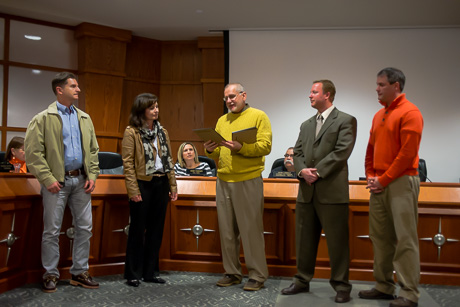
During Monday's meeting of the Batavia City Council, three local businesses were honored by the Batavia Development Corp.
Each received a plaque in recognition of the owners' successful completion of a loan program that helped them expand or grow their businesses.
Above, Susan Francis, owner of The Color Salon, with the her husband John Zola, receiving a plaque from Ray Chaya, a member of the BDC Board, Council President Brooks Hawley, and BDC VP Gregg Torrey.
CORRECTION: Francis and Zola are not married.
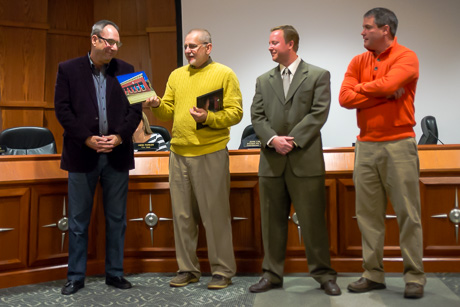
Steve Mullen, owner of Larry's Steakhouse.
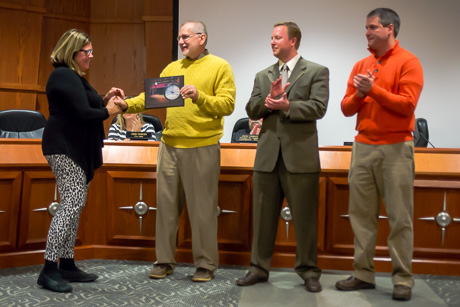
Mary Valle, co-owner of Valle Jewelers.
A possible transformer explosion is reported in the area of 235 State St., Batavia.
City fire responding.
UPDATE 9:37 a.m.: A problem was found with a transformer, but no sparks or smoke. National Grid needs to be notified.
UPDATE 10:25 a.m.: City fire back in service.
The governor's office has announced a $750,000 grant for a community bike trail in the City of Batavia.
From the press release:
Governor Andrew M. Cuomo today announced approximately $70 million in awards to fund 68 bicycle, pedestrian and multi-use path transportation projects in New York. The projects, funded by the Federal Highway Administration and which leverage a total investment of $103.7 million, will promote walking and biking, and boost tourism and economic development opportunities in dozens of communities across the state.
"These projects will help communities become more walkable and bicycle friendly, as well as show off the natural beauty that exists in every corner of this state,” Governor Cuomo said. “I thank the Federal Highway Administration and our representatives for helping the state secure this funding so that residents and visitors alike can enjoy New York like never before."
The projects include the addition of accessible sidewalks, improved pedestrian access to public transportation services, construction of new bicycle and pedestrian facilities, and the preservation and conversion of abandoned railroad corridors for trail use.
New York State Department of Transportation Commissioner Joan McDonald said, "We are investing in projects that meet the increasing public demand for walkable and bikeable communities, while promoting sustainable transportation alternatives, tourism and recreation, and local and regional economic development. Governor Cuomo has shown a historic commitment to investing in transportation infrastructure in New York State, including making bicycle and pedestrian safety a priority."
The funds are made available to the State through the Federal Highway Administration and are administered by the State Department of Transportation. The program provides up to 80 percent of the cost of each project, with the remaining share coming from the project sponsor. The funds are dedicated for strategic investments in transportation alternatives and with a local sponsor match of more than $33.6 million, support a total investment of nearly $103.7 million.
The projects announced today were chosen through a competitive solicitation process and rated on established criteria that included public benefit and community support for the project; connectivity to an existing transportation system; how well the proposed improvements benefit walking and bicycling; impact on local or regional economies; availability of matching funds; and ability to deliver the project within federally required timeframes. (A total of) 135 applications were received.
Selected projects relate to one or more of the following categories: on-road and off-road trail facilities for pedestrians, bicyclists and other non-motorized forms of transportation; infrastructure-related projects and systems that provide safe routes for non-drivers to access daily needs; use of abandoned railroad corridors for surface-transportation related trails; scenic byway turnouts and viewing areas; safe routes to school; construction of boulevards and complete streets thoroughfares; and storm water management related to highway runoff.
The full press release goes on to list the other projects in the state.
UPDATE: The DOT sent over this supplemental information about the Batavia project.
Former Batavia City Councilman and Le Roy High School graduate Barry W. Bower died Wednesday (Oct. 22) at the University of Maryland Medical Center. He was 81 and a resident of Hanover, Pa.
Born Oct. 26, 1932, in Batavia, he was the son of the late Roland H. and Vivian (Chapman) Bower.
He was retired from Scott Foresman Company in New Jersey after working there many years. After graduating from Le Roy HS, he attended the State University Teachers College in Geneseo. He was an Army veteran who enjoyed bowling and was an avid golfer. He loved the Batavia Muckdogs, but especially enjoyed spending time with his family.
Friends and colleagues are invited to join the family for a Celebration of Life from 2 to 5 p.m. Sunday, Nov. 2, at the Terry Hills Restaurant and Banquet Facility Conference Room, 5122 Clinton Street Road, Batavia, NY.
Online condolences and memories may be shared at: www.murphyfuneralhomeinc.com
For his full obituary, click here: http://thebatavian.com/obituaries
The City of Batavia will observe Halloween activities from 5 to 9 p.m. on Oct. 31st only. Police Chief Shawn Heubusch reminds trick-or-treaters to use caution when crossing any street; always use a clearly marked crosswalk; and look both ways before entering the crosswalk. Younger trick-or-treaters should always be accompanied by an adult. Be safe and have a Happy Halloween!
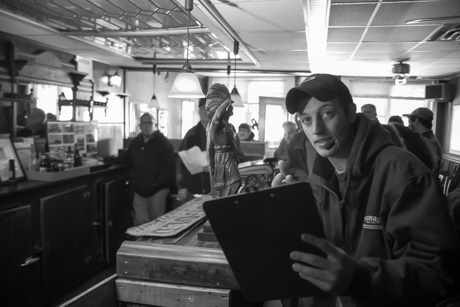
Dozens of people, including a few local business owners, packed into the former Delavan's Restaurant, 107 Evans St., Batavia, this morning for an auction of the building's contents.
Everything sold, except for the kitchen sink and the building it's attached to.
The real estate is still available, so here's your chance to own your own bar and grill, or maybe the ultimate man cave.
The auction was conducted by Bontrager's.
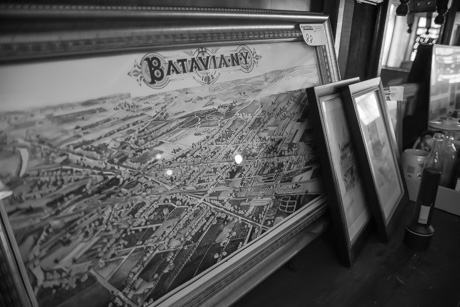


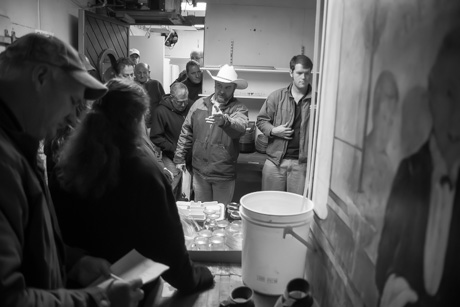
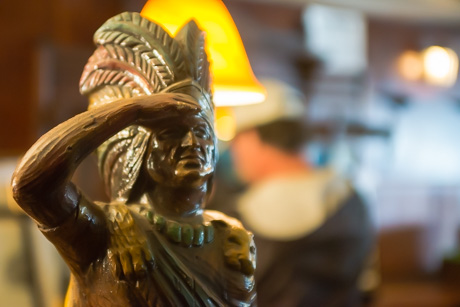
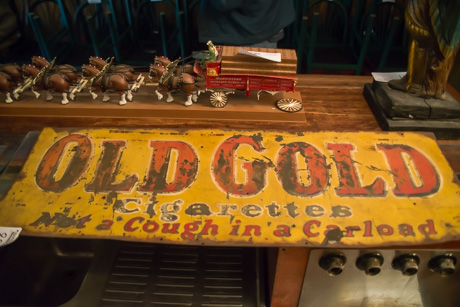
Carolina M. Frias, 34, of Law Street, Batavia, is charged with theft of services, petit larceny and criminal mischief. She was arrested Oct. 23 at about 6:20 p.m. in front of 140 W. Main St. for alleged petit larceny, criminal mischief, 3rd, and theft of services stemming from an incident on Oak Street on Oct. 22. Frias is suspected of damaging and removing various items from a hotel without permission along with not paying for her stay. She was jailed in lieu of $2,500 cash or bail. The incident was investigated by officer Nedim Catovic, assisted by officer Eric Foels.
Abner C. Black, 60, of Liberty Street, Batavia, is charged with third-degree assault and criminal mischief, 4th. Black was arrested in front of City Centre on Oct. 25 following an incident on Oct. 24 in which he was allegedly involved in a domestic dispute on Chandler Avenue. He allegedly shoved a female against a refrigerator and took her cell phone when she tried to call 9-1-1. He was jailed in lieu of $3,000 cash or bail. The incident was investigated by officer Nedim Catovic.
Donna Ann Corcoran, 41, of St. Mary's Street, Pavilion, is charged with criminal possession of a controlled substance, 7th, unlawful possession of marijuana, and second-degree promoting prison contraband. She was arrested in the Town of Pavilion on Oct. 24 and brought to jail for an incident related to a DWI investigation. While inside the Genesee County Jail, it is alleged that Corcoran possessed a controlled substance and marijuana, which led to the aforementioned charges. She was issued an appearance ticket and is to answer the charges in city court on Nov. 19. Corcoran was also charged with driving while ability impaired by alcohol, failure to keep right and consumption of alcohol in a motor vehicle in the Town of Pavilion. She received traffic tickets for those alleged offenses and is to appear Nov. 18 in Pavilion Town Court. The incident was investigated by deputy Joseph Graff.
William J. Mellema, 50, of Almay Road, Rochester, is charged with unlawful possession of marijuana, aggravated unlicensed operation, unlicensed operation of a motor vehicle, and driving over state 55 mph limit. On Oct. 11 on Route 98 in Elba, Mellema was arrested on the charges following a traffic stop in which he allegedly admitted to having a bag of pot and a glass smoking pipe. He was arraigned in Elba Town Court and jailed on $800 cash bail or $2,000 bond. He is scheduled to reappear in Elba Town Court on Nov. 18. The incident was investigated by deputy Joseph Loftus, assisted by deputy Joseph Graff.
Harold Chinn, 49, of North Main Street, Oakfield, is charged with petit larceny for an incident that happened on Sept. 23 on Veterans Memorial Drive. Chinn allegedly stole a cell phone that another patron of Walmart had left behind at the check-out counter. He was arrested Oct. 19 and issued an appearance ticket for Batavia Town Court on Nov. 3. The incident was investigated by deputy Joseph Loftus.
Monique Annette Mcmillian, 30, of Elmdorf Street, Rochester, is charged with aggravated unlicensed operation of a motor vehicle, 3rd, and operating a vehicle with a suspended registration on Oct. 9 in Stafford. Following her release from Monroe County Jail, Mcmillian was turned over to the Genesee County Sheriff's Office and subsequently arrested and jailed on $175 bail or $250 bond. She is to reappear in Stafford Town Court on Nov. 13. The incident was investigated by deputy Joseph Graff.
Copyright © 2008-2022 The Batavian. All Rights Reserved. Privacy Policy | Terms of Service